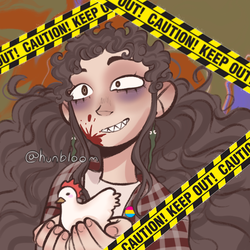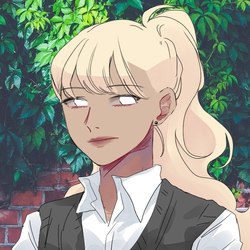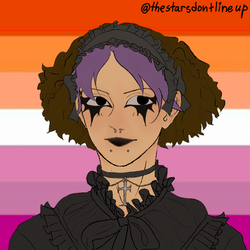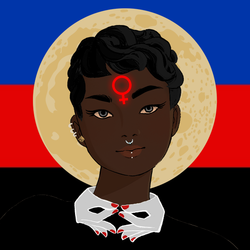Dee2000
Planetoid
- Joined
- Dec 26, 2021
Introduction: A World of Darkness
Hello! My name is Melody and I have been craving a Mage: The Ascension themed roleplay ever since joining this site. However, I've found that the lore seems to be a bit of a deterrent for potential partners, so I have decided to write an entire request thread that covers all the lore you would need to know if you're interested in playing one of my favorite cravings so far. This isn't going to be a comprehensive description of the centuries-long Ascension War with all the ins and outs of super obscure, bizarrely esoteric subplots within the seemingly-endless metastory that is Mage, but I WILL cover the basics.
Just a quick note: yes, this is a MASSIVE fucking thread, and I do not blame you AT ALL if you don't want to read every word of it. Like, seriously, you don't even have to skim it. I will not be offended and don't mind rephrasing/reiterating things if you are interested. This is really kind of a self-indulgent, last-ditch effort to get my favorite rp ideas off the ground, so feel free to completely ignore me.
Anyway, in case you aren't even tangentially familiar with the world of Mage, let's get you acquainted with:
The World of Darkness: In these roleplays, we will be in a "dark reflection" of our own world. In this gothic-punk universe, the buildings are tall and cast long, dark shadows. Greedy corporations like Pentex perform horrifying experiments on their employees in their quest to unleash the apocalypse, while massive secret societies control the ebbs and flows of human understanding. Ancient monsters wage war against each other, while petulant little shits make a mockery of those Newtonian rules we consider so sacred-- this latter group being the titular Mages of Mage: The Ascension.
As far as Mage is concerned, the World of Darkness is a place where reality bends and folds. It changes to suit the desires and beliefs of humankind. As long as you're stubborn enough, you can simply will a tumor into oblivion. As long as you believe in the right gods, you can channel the spirit of the mighty lion and change your shape into a marvelous beast. As long as your ideas about science are crazy enough, you can craft a sentient AI who knows the answers to all the questions one might ask. It's all in what you believe, plus or minus the rest of humanity, of course-- what we consider "objective reality" is the result of everyone's collective belief in certain theories and laws. This is called the Consensus, and it has cause a lot of fucking problems in the world of Mages.
This brings us to the Ascension War, perhaps the most influential event in the history of the Awakened (another name Mages like to call themselves). The war has since died down from the outright violence of the Renaissance through the 1990s, but tensions remain high, and echoes of this most ancient conflict continue to bound through the cosmos. There are four major actors in this war, and they are:
The Technocratic Union, the self-proclaimed victor of the Ascension War, though other groups would protest, of course. Presenting itself as the side of reason and rationality, the Technocracy is dedicated to the eradication of mysticism and superstition in the world. By any means necessary, once upon a time, but as the 21st century progressed the Technocracy became . . . "kinder" isn't the word, but it has shut down its labor camps and no longer kills mystic Mages on sight. Technocrats are by no means friendly towards their mystic counterparts, however, and the "decency" that they have learned since the 90s can recede at any moment if a mystic gets a bit too uppity.
The Council of Nine Mystic Traditions, the original enemy of the Technocracy. Though the majority of Tradition Mages cling to ancient practices from around the world, defending important cultural magics from the genocidal march of the Technocracy, the name is somewhat of a misnomer, as newer groups whose practices spit in the face of tradition have been known to join the council (most notably the Society of Ether, a group of mad scientists whose experiments are always much flashier and more exciting than what one might call "true science," and the terminally online Virtual Adepts, whose magic is markedly a modern conception despite its roots in math-based practices from ancient Greece). The throughline that holds this tense, shaky organization together is their dedication to a more malleable reality, one in which anyone can warp through belief.
The Nephandi, what you might call the villains of the Ascension War. Utterly depraved and sick, these fuckers embody all that is wrong with the world of darkness. Their rites and spells are twisted and vile. Their power turns humanity into a mess of blood and trauma. And the worst part? It looks like they might be the true victors after all. I should note here, this faction is only here to give you a greater sense of context and not because I plan to have any non-villain Nephandi in my roleplays. The original rulebook warns against playing Nephandi, and having read enough about them I 100% agree with the authors' official opinion on this one; there's very little you can do to convince me to indulge this kind of depravity.
And finally, the Disparate Alliance, a shaky, newly-forged group of mystics from various cultures who either know nothing about the Ascension War (these are often called Orphans), choose not to participate, or see the Technocracy as the single greatest threat to humanity and think that the Traditions are too limp in opposing it. The Crafts, as they are sometimes called, see themselves as the only opposition to the monolithic technocracy with teeth, and they often work from the shadows, choosing to avoid catching the ire of the Traditions or the Technocrats as they work undermine the powers that be. That is, of course, when they choose to participate in the war at all.
Magic: So, that is the basic political landscape of the world. But why is any of this happening? We know reality is malleable and each faction has its own rough view of how that malleability should be used, but how exactly does belief change reality?
Ask 20 Mages and you'll get 20 answers. Simple as that. However, there are some commonalities that continue to pop up.
To begin with, there are three components to how a Mage warps reality, collectively referred to as their focus. These three components are what the Mage's basic beliefs about reality are, referred to as the paradigm; the important actions, rituals, and practices they use to turn that belief into action; and the tools employed by that practice. These three elements, more than anything else, define how a mage can "break the rules" of the Consensus. To give an example of this in motion, let's go back to the cancer example. A mad scientist who believes that everything can be changed by simply working with small parts might employ nanobots to disassemble the tumor cell by cancerous cell, while a Pagan healer might invoke the god of good health and sacrifice an item representing the tumor to win that god's favor. In both of these ways of viewing the magic, we see how the Mage views the world (to the scientist, you must affect things on a molecular level to see change, while the Pagan believes the world is run by supernatural gods), what actions those mages take in enacting that belief (the scientist uses technology to affect the tiny building blocks of reality while the Pagan asks their appropriate god for assistance), and what tools such actions require (the scientist, of course, uses nanobots, while the Pagan employs an effigy of the illness they wish to destroy).
This gets messy when one considers the fact that the Mages here aren't the only people in the world. Remember the Consensus? Well, it's a bitch, and it won't always just roll over and take it when some arrogant little mortal wants to tread outside the bounds of what humanity defines as possible. This is where the nasty fucking hurdle of Paradox comes in; the Pagan might think their god infallible, but centuries of Technocratic control of the global Consensus make such entities imperfect things. In the best case, a failure is just that: a failure. But if our Pagan friend fucks up bad enough, the tumor could grow. Or their god might curse them is pestilence for their improperly-performed ritual. The spell backfires, essentially, because reality doesn't like getting poked and prodded too much, and it WILL eventually bite back if you try to push it around with impunity.
And the scientist isn't safe, either. Nanobots are an imperfect technology, and though Paradox is much less likely to afflict them, a skeptical enough region, or one where superstition holds much greater sway, the bots could injure the patient. Or they could even become sentient and rebel against the doctor. Imagine seeing the rise of Skynet because a Rick Sanchez wannabe got too cocky and tried to treat a cancer patient with nanobots. That's how nasty Paradox can get.
I'll conclude this section by discussing how Mages progress. Learning magic in the World of Darkness-- and I mean true magic, not the disciplines of vampires or the gifts of werewolves-- is a more internal process than external. A mage can learn new spells, of course, but in this case they're just learning different ways to employ the knowledge they already have. But to truly gain new knowledge-- to "level up," so to speak-- requires active meditation and self-discovery, guided by what we call the Avatar (or Genius if you're a Technocrat).
A Mage's Avatar is a representation of their "higher self." It isn't truly separate from the Mage, but it isn't truly PART of the mage, either. To put it simply, the Avatar is an internal guide that can help a Mage work through personal blocks and mental ruts, magically speaking, in what are called Seekings. A Seeking is no easy lesson, of course-- if it were, every Mage would have mastered the secrets of the cosmos by now-- but the rewards are high and wonderous. Our Pagan friend, for example, might contact their avatar in search of some insight into their ancestor's rites that will increase their understanding of EVERYTHING. We're long past the caner rite now; if successful, the seeking could lead the Pagan Mage to a vital piece of information that lets them transform tumors into living entities they can control while simultaneously conjuring a mighty spirit of the natural world to destroy every illness which seeks harm their family. The scientist's Seeking, on the other hand, is likely to resemble a session of intense study guided by that little voice we all (presumably) have in our heads, one which takes several nights but ends with the scientist learning how to restructure their nanobots in such a way that they can be reprogrammed mid-process.
Chapter 1: Ascension Warriors
One last piece of cosmic lore: each faction in the Ascension War has different sects. For plot twist purposes (and to discourage Nephandi plays), I'll focus on the Traditions, Technocracy, and Disparates. I'll try to keep each description brief-- just one sentence giving you the core concept, and then we'll have a list of stock characters that we can pick from if we want to rp. Obviously, you don't need to pick one of my stock characters. I absolutely encourage you to make your own as well!
The Council of Nine Mystic Traditions, as you might expect, has nine different sects, each associated with a Sphere, or area of influence that a Mage can specialize in.
The Akashayana, formerly called the Akashic Brotherhood, are a group of martial arts-focused Mages who employ the mystical practice of Do ("The Way") to balance their minds, bodies, and spirits. They are associated with the Sphere of Mind, a magical area which specializes in the understanding of both one's own mind, and the minds of others.
The Celestial Chorus are a universalist religious order that descend from the Catholic states which controlled early medieval Europe who believe that all gods are simply lesser manifestations of a single true god, called The One. They are associated with the Sphere of Prime, which controls the basic building blocks of magic and reality itself.
The Chakravanti, formerly called Euthanatos, are a group of Mages with roots in India and Greece who view themselves as preservers of the Wheel of Fate. The Chakravanti are associated with the Sphere of Entropy, an area of influence defined by fortune, chance, and decay.
The Order of Hermes are the oldest and proudest Tradition-- and I mean that as an insult-- who serve as the classic, academic wizards in pointy hats learning magic from ancient masters in beautiful medieval castles. They are associated with the Sphere of Forces, or energy (whether that's fire, radiation, gravity, or wind).
The Sahajiya, formerly called the Cult of Ecstasy, are known for for three things: sex, drugs, and rock and roll; they are a group of hippies and experience junkies who believe that extremity allows one to perceive and manipulate the fundamental elements of reality. They are associated with the Sphere of Time, which, of course, controls the perception and flow of time.
The Verbena are probably who you're thinking of when you hear the word "witchcraft--" consisting of a variety of nature-worshipping occultists, the Verbena perform magic in ancient glens and forests, harnessing the power innate within life and nature. They are associated with the Sphere of Life, which influences biological entities.
The Kha'Vadi, formerly called the Dreamspeakers, are a Tradition with a strained relationship to the other eight on account of the more Eurocentric members of the Council having participated in the violence and genocides of colonization. The Kha'Vadi are a loose group of spiritualists from Indigenous cultures throughout the world-- whether they're from the Navajo Nation or Ghana-- who in the early days of the Council were (often incorrectly) described as animists. They are associated with the Sphere of Spirit, which influences spiritual entities and allows for travel into the spirit worlds known to other Mages as the Umbra, due to this fundamental assumption.
The Society of Ether, formerly called the Sons of Ether, are a relatively new tradition, and one of two black sheep in the Council of Nine; they are technomancers, much like the Technocrats themselves, but their view of science is as a fluid understanding of reality rather than a rigid enforcement of it. Having descended from the Alchemists of the Renaissance, they are associated with Matter, the sphere of non-living mass.
Finally, The Mercurial Elites, called Virtual Adepts once upon a time, are the newest and most chaotic group to join the Traditions, and another black sheep-- this time as practitioners of internet-based technomagic, often focusing their arts through the world of online games, social media, and hacking. Theirs is the Sphere of Correspondence, the Sphere of distances.
The Technocratic Union has five Conventions, all of which handle one managerial arm of the Technocracy while also coming with their own ingrained ideology.
The New World Order is the classic "black suits and mirrorshades" branch of the Technocracy who serve as "reality cops," enforcing the Technocratic paradigm throughout the world and stopping threats before they arise.
Iteration X is the Convention that gives all the other Technocrats the toys and gadgets that make the Union so enticing. They focus on the creation of various kinds of "hypertech," which for our purposes is a combination of technology and magic. They create the robots, tools, and the iconic BFGs (Big Fucking Guns) of the Technocratic Union.
The Progenitors are the biological Yin to the Iteration X's mechanical Yang, serving as doctors, clone-raisers, and enhancement-growers of the Technocratic Union. They perform to vital functions within the union: creating new abominations of science for the upper ranks to deploy as shock troops, and keeping said shock troops alive.
The Syndicate is the financial branch of the Technocracy, and both funds its incredibly expensive escapades and uses a form of Enlightened Science (the Technocratic equivalent to Magic) called Hypereconomics to shape reality. The sciences of the Syndicate involve the manipulation of people's resources and desire, using human psychology and access to wealth to make adjustments to the world as needed.
The Void Engineers are like the Society of Ether or Mercurial Elite in the Traditions-- a black sheep Convention that hasn't fully won the respect of the others. Predominantly made up of astral explorers and dimensional scientists, the Void Engineers protect Earth from either extraterrestrial or extradimensional threats (exactly which term applies depends on how you explain what mystics call the spirit world or Umbra) while also explaining or understanding bizarre, alien region of reality.
Finally, The Disparate Alliance has the larges amount of subgroups, with 10 internal factions that squabble over how best to combat the threats of the Technocracy, Traditions, and Nephandi.
The Ahl-i-Batin are a group of Muslim mages who believe a fundamental unity runs through all things. These masters of sympathetic magic were once founding members of the Council of Nine Traditions, but they eventually broke off from the group to protect the Middle East from the Technocratic onslaught. Needing new allies, however, the Batini have come together with a number of other former traditions to form the Disparate Alliance.
The Children of Knowledge, or Solificati, are a group with a tumultuous history. Having once been the alchemy-focused branch of the Order of Hermes, the Solificati are technically founding members of the Traditions until a rather famous member of the group betrayed them and got the entirety of the Solificati removed from the Traditions. Long story short, they have joined with the Ahl-i-Batin to oppose the Technocracy.
The Hollow Ones are a group of magical nihilists who are more often defined by their goth aesthetic than they are by a specific magical ideology. Often consisting of outcasts and rejects, the Hollow Ones have always provided a place for the detritus of magical and non-magical society alike. They were once candidates for a tenth tradition, associated with a tenth Sphere theorized to exist by the Batini, but have since grown weary of the politicking and pretentions of the Council.
The Ngoma were once the African branch of the Order of Hermes, but were frequently lumped in with the predominantly Native American Kha'Vadi instead of being recognized as the academic magical experts that they truly were. Made up of a variety of African spirit-workers and wizards, they are loosely associated with the other Disparates for the sake of opposing the Technocracy.
The Bata'a are another predominantly-Black group that the Traditions tried to wrongly associate with the Kha'Vadi-- though some were pushed to join the Verbena instead. The Bata'a practice a number of syncretic religions formed or brought to the Americas by enslaved Africans and their African-American descendants such as Voodoo and Santeria.
The Kopa Loei came to the alliance after its initial founding by the first five members. They are one of the smallest groups in the alliance as they only allow Indigenous Hawaiians to join. They work as protectors of both Hawaii's spiritual practices and its traditional ways of life. They are much more than just a magical tradition; they are community defenders, anti-colonial activists, and willworkers. Much like the Batini, their reason for joining the Alliance was to find new allies in protecting their home and magic from the Technocracy.
The Knights' Templar were formerly members of the Cabal of Pure Thought-- a precursor to the NWO-- who left when the Technocracy started to enforce reality through the lens of science rather than Christian theocracy. A black sheep in the Alliance, they tend not to play nice with other groups due to their militant nationalism. They are only tentatively members in opposition to the "Satanic" Technocratic Union.
The Sisters of Hippolyta are a group of feminist Greek Pagans who worship the queen of the amazons, Hippolyta. They have joined the Disparate Alliance on shaky ground; it might not be the perfect magical secret society, but its better than the Technocracy, which seeks to organize people into rigid social roles in a way that too closely resembles the patriarchy for comfort, and the Traditions, who wear their dedication to often-patriarchal medieval traditions on their sleeve (it's literally the name of the game for them).
The Taftâni are another predominantly Middle Eastern group of Mages with roots in Persia. They have a profound disdain for the Consensus, which they consider to be a massive lie that most people believe. They often indulge in acts of obvious magic, both defying reality's "laws" and tempting the ever-present threat of Paradox. Their lack of subtlety makes them an impossible candidate for the Traditions, and they're far to mystical for Technocratic tastes, so they have joined the Alliance due to the fact that they have nowhere else to turn for help in opposing "reality."
And finally, the Wu Lung are the only other organized group of Mages known for practicing Do. They are far more exclusive than the Akashayana, enforcing a policy that only allows those of Chinese descent (in some subsets of this group, members of certain families are allowed to join). Naturally, they view the Traditions-- especially the Akashayana-- as too syncretic, and thus they have chosen to take up arms alongside the Disparates.
Chapter 2: Characters and Adventure Hooks
That's basically it for the lore. I skipped a lot, so if you're a fucking lunatic and want me to accost you further with Mage/WoD lore, let me know! But also, why? Why would you subject yourself to that? I enjoy it a lot, obviously, but like, if you can't tell by now I'm fucking rabid when it comes to my special interests, so, you know . . .
Anyway, let's move away from the cosmic scope and zero in on the grains of humanity I like to build my rps around. This section presents you with a few characters, and at least one adventure hook for each one, plus a few group adventures if you're more into that! It will be constantly growing, of course, because I have a lot of character ideas and no Mage group to play with because literally nobody plays Mage and it makes me want to cry.
And now, without further ado, I bring you the reason you're actually here for:
Traditions Characters
Leslie McAlaster: Perpetually embarrassed by her own magic, Leslie is (in her own words) "a grown-ass woman who writes fanfiction to fill the empty fucking void of her life." Leslie's Avatar is . . . whimsical, to put it kindly. But to be a bit more accurate, her Avatar is childish-- literally just Queen Elsa but meaner. Like right down to Leslie calling her Elsa. As a Mercurial Elite, she concentrates her magic through the fanfics she writes, using the truths from within herself that she infuses into her stories to empower herself and others. She is an enchantress, a Mage who casts lingering spells whose effects continue to touch their targets long after the spell is over, which tends to put a target on her back-- the Technocracy can't have sleepers and reality deviants walking around with ambient magical effects all the time, after all.
Letting it Go: Leslie is a bit new to this whole "magic" thing. She's rather reluctant to claim her power, much to her Avatar's chagrin. This rp is a classic story as far as Mage (the game, not the concept) is concerned-- Leslie finds a mentor to guide her through the World of Darkness and help her to grow into her own as a Mage, but there is only so much another person can do for her. As begins to reach the limits of her training, her Elsa-shaped Avatar starts to stir and push her through her inhibitions, fighting her reliance on her mentor just enough that she can finally abandon those deadly inhibitions which keep her feet chained to the ground as both her mentor and Avatar try to help her in defying gravity.

Evelyn Goodman: A Euthanatoi-- and she makes a point of using the outdated, vaguely "Greek" sounding name for her tradition-- Evelyn is an unexpectedly heroic member of her group. Other Chakravanti view her with disdain, seeing her more as a jingoistic, trigger-happy stereotype of their extensive magical practice. Meanwhile, Mages from outside the Chakravanti, ironically, have a view of her that seems to fit her own view of herself better. Evelyn is not a grim undertaker who works with dead bodies by day and hunts serial killers night, nor is she a serious diviner who tells prophecies and seeks to understand the natural balance of fate. Focusing her magic through her conviction and the weapons she uses to enact a vaguely defined "greater good," Evelyn slays dragons. Not giant, fire-breathing lizards, of course-- such creatures couldn't exist today with the Consensus as warped towards the Technocratic paradigm as it is-- but instead she finds the modern embodiments of the greedy, treasure-hoarding, commoner-oppressing beasts of ancient lore. Her kills aren't part of the wheel that many of her contemporaries envision-- she couldn't care less what her victims reincarnate as, if they do so at all-- instead they are a means to liberating their hoards and giving them to the peasants they were denied.
Evelyn the Good: The World of Darkness is a place of great and monolithic evil. Proverbial beasts the size of skyscrapers plague the world. These days, you can't swing a blunt sword without hitting a dragon. Which is why Evelyn Goodman is a busy woman. Evelyn believes in "goodness" as a tangible thing, an energy that can grant supernatural power-- when you're on the right side, the universe will conspire in your favor. This, of course, gives her the perfect excuse to take on the many powerful evils that afflict the world around her. With a handgun named Gramr, she goes from place to place slaying corrupt businessmen and politicians. This rp focuses on Evelyn's misadventures with an as-of-yet-undefined sidekick. Perhaps a "damsel" she rescued from one of her modern dragons? Perhaps another knight in leather armor like herself? The options are (almost) limitless!

Annabel Jones: There are only two words to properly describe Annabel. Batshit and crazy. Where most mages go through a process known as Awakening, Anna was just . . . kind of always a bit magical. And not in the fun, whimsical way, but more in the feral, "wouldn't it be funny if you didn't have bones anymore? OH, SHIT, I JUST MADE YOUR BONES DISAPPEAR!" way. Anna is the pure embodiment of the chaotic energy of the Society of Ether, performing wild experiments that get more and more bizarre as time goes on. Her crowning achievement to date is breeding a very small, highly aggressive species of rooster that she dubbed the "chihuahua chicken--" and lived to tell about it! In another life, she may have been a Progenitor, but Technocrats take one look at her and their hearts stop. She's completely feral, completely untamable, the human embodiment of science unbound.
She Blinded me with Science: A romcom with a twist-- that being that one of the leads is a literal mad scientist. As far as cackling, horror-creating, lab coat-adorned supervillains go, Anna is fairly benign, more likely to create a Whacky Wednesday device than a doomsday device. But she's still essentially a manic pixie dreamgirl with the technological know-how and resources to graft graft rocket boosters onto your feet as a Valentine's Day gift. There's really not much else to say here. It's really just a classic love story between a wild gremlin woman and her (potentially saner) girlfriend.

Technocratic Characters:
Emily Larson: A member of the Progenitors, Emily Larson has always had a romantic view of science. Through her favorite childhood films such as Jurassic Park and The Rocky Horror Picture Show, Emily learned to view the world through a lens that makes anything possible through the wonders of technology. Even as a young child, she mixed random substances together and messed with what she considered "normal" or "human" in terms of biological taxonomy, which led to some very . . . interesting incidents in her early college years. She never performed horrific experiments on unwilling victims, but she did make herself a sort of scientific canvas-- a display that many called madness, but the higher-ups at the Technocracy found an interest in her supposed madness. Partially to control it and partially to wield it, the leader of her local Technocratic Amalgam reached out to her and offered to either let her study with the Progenitors, or simply erase her memory and all the knowledge she had accrued through her romanticized, esoteric research into the science of living things.
The Unmutuals: Emily isn't the perfect Technocrat. Her induction into the organization was a bit less than of a willing act and more a result of her only choice being that or the loss of what she held dearest. Likewise, her standing in the Technocratic Union is incredibly poor. She is teetering between a bare minimum of loyalty to the organization and the kind of "unmutual" behavior that could land you in a "re-education" room with a brainwashing regimen and some very unsavory "classes" on Technocratic principles. But one day, as she is speaking with one of her fellow Technocrats, something seemingly impossible happens. She finds someone like her. Someone whose dedication to the rigid stasis that the Technocracy considers "true science" is less than perfect. And overall, someone she can confide her doubt in without fear of total destruction.

Carrie Roman: Agent Roman is the very embodiment of the Technocracy's overbearing paradigm. Methodical and machine-like in her activities, she is fiercely loyal to the NWO and she only taps into the Enlightened Science that most superstitionists would call "magic" when absolutely necessary to subdue a particularly nasty Reality Deviant. She is a remorseless killer, but also an efficient one who takes no joy or grief in the grim exercises of reality-enforcement. Of course, this is all the image she puts forth when working. There are precious few people close enough to her to see what she really is: a woman caught in the throes of decay, her zealous pursuit of perfection leading to degradation of her mental and physical health. She is a machine, alright-- a machine with no regular maintenance that is beginning to fall apart and has no engineer to come perform necessary repairs.
Humanizing: Agent Roman is more than human. At least, that's what she thinks of herself. Constantly, she pushes herself beyond human limits. She exerts herself past the maximum effort that she can give. As an NWO agent, she subjects herself to horrible trauma every day: corpses, violence, cruelty unimaginable to even the wildest of mystics. But she never lets the facade slip. She is a machine made flesh. She is unstoppable. Her eyes are dry. Her breath is steady. She shoves it all down and lets it dissolve. She is a machine made flesh. Of course, as stated in her bio, she isn't what she thinks of herself. She's falling apart the longer she goes on. A burnout so glorious it could melt her into an orange puddle of liquid steel threatens to claim her, to destroy not only her self-image but her very physical health. Repetitive stress injuries stack. Headaches accompany her non-reactions. Going too far comes with pulled muscles and sprained ankles. Someone working with her recognizes this, however, and a battle between their concern and her lack thereof begins.

Autumn Grey: Agent Grey is rarely seen outside of a restricted Technocratic setting due to the obvious biological enhancements placed in her eyes. She is an information master, a "mentat," to borrow terminology from her favorite book series, who sees in five dimensions and plays a game in which she places traps and moves several months in advance. Her magic, likewise, involves the synthesis of what is known with what is possible. She makes small adjustments, just a slight nudge to probability, to ensure that the next card she draws is an ace, to ensure that her opponent forgets to consider the knight she has hidden at the edge of the board, to ensure that hers is the winning lottery ticket.
Lies, Greed, Misery: Autumn Grey is one of the less exciting Technocrats out there. She doesn't have a BFG, and she doesn't rip the fabric of this dimension to explore the outer reaches of the cosmos. But she certainly makes up for it in her potency. Armed with a slightly-easy-to-conceal enhancement that gives her a short datacrawl on the people around her, she is able to use dark psychology on those around her to give the illusion that she is using "mind magic." Which is why it is incredibly frustrating when she comes across an uppity Reality Deviant (Technocratic term for Mages) who won't simply succumb to her tricks. Even when she pushes her enhancements to the limit, their psychological profile remains impossible to manipulate. Is this the first step in Agent Grey's path to redemption? Or is it the beginning of her undoing? Will she learn to respect the agency of those she considers beneath her? Or will her petulant arrogance destroy her as she tries to crack the Mage's armor and sustain her abusive power trip?

Disparate Characters:
Amelia Reed: Emily is an Orphan, someone who learned magic on her own and knows very little about the Ascension War. Of course, not knowing whose interest she might have drawn at the height of the Pogrom, the genocide that the Technocracy implemented against mystic Mages, had its . . . drawbacks. After one too many times summoning her patron spirit, Amelia was captured by a troupe of NWO agents who were in search of subjects for something called Project Beacon. Thus, Amelia was imprisoned in a secret facility between 1996 and 2003, a time when she was subjected to inhumane experiments intended to suppress her abilities through a variety of psychological and biological methods. Her mind slipped as a result of the trauma inflicted by these horrific experiments, and when she was finally released from her own personal hell, she suffered from persecutory delusions. Today, Amelia is on her own in a house haunted by the memories of her magic. She can summon spirits, but not willingly. She manifests monsters in the closet, shadows on her window, strange devices in the mail, and so she isolates, keeping herself in a new prison despite the Pogrom supposedly being a thing of the past.
The M Word: Mages have another name for what Amelia is-- "Marauder--" and it's an ugly one. One that carries with it isolation and fear. For years in both the setting and the text of the Mage rulebooks itself, Marauders have been treated as monsters whose minds are so far gone they're better off without a pulse. Marauders are not affected by Paradox the same way other Mages are, with anything too wild that they do afflicting the nearest Mage instead. This, too, makes them lonesome people with no support system to rely on-- something that can be vital to those suffering from mental illness as serious as Amelia's. But not everyone is so cruelly ignorant. This story focuses on what happens when someone recognizes Amelia's trauma and suffering for what it is, and rather than demonize and fearing her they reach out, they fight to protect her from those who would rather she be erased (the Technocracy doesn't like evidence of the Pogrom outliving the cruelty itself), and above all else they give her that precious connection we as humans all need to survive, even when we're not all there.

Christina Peralta: A member of the Hollow Ones, Christina desperately wishes she was a tough badass. However, it's clear from her Brujeria's lack of teeth and her love for healing her friends and family that she's more of a "mom friend" than the brick-throwing asskicker she presents herself as. She has cast curses before, but only to protect her friends from abusers or enemies, never to avenge disrespect or to achieve a selfish goal. This doesn't mean she's a fluffy bunny, though-- all that black lipstick and dramatic eye makeup isn't just an aesthetic for the Hollow Ones, after all. Fiercely loyal, and skilled at her magic of choice (once more, Brujeria), she is a classic archetypal witch with a heart of gold and modern sensibilities.
Cariño Amarga: Christina can be sweet when you're on her good side. But when the people she cares about are in danger, she becomes one of the most powerful forces for destruction you have ever seen. In this classic rescue story, Christina sets out to rescue one of her closest friends (or maybe even her girlfriend/SO) from . . . something. A Nephandic cult, a Technocratic lab, a vampire's scheme. Something deadly that justifies a no-holds-barred, gloves-off battle between Christina and her enemy.

Claire Bankole: A born-again Voodooist and member of the Bata'a, Claire herself deals in luck and necromancy, often seeking advice from her ancestors and trusting their judgements entirely. She is a quiet girl, but not one to forget an act of evil when it comes time to call up the spirits of her past and sic them on some deserving bastard who thinks living in the World of Darkness gives them free reign to slip into utter depravity. Usually she keeps to herself, though, happy to explore potential futures with her ancestors and nothing to worry about.
Voice of Fate: One thing remains true to Claire-- fate is not what the gods impose, it is what we do. Why the fuck would you read a Tarot spread if the outcome is fixed? Why the fuck would you cast a set of bones if there was nothing you could do about what they had to say? A prophecy of doom hangs over the World of Darkness-- the Apocalypse that the werewolves foretell, a Nephandic victory, the end of Magic altogether, something tremendous-- and she knows that there has to be some way to fix it. Teaming up with another Mage, Claire sets out to stop her own prophecy from manifesting. It's a big thing. She can't do it alone. But she sure as fuck is going to try.

Ella-May Carter: Guitarist. Singer. Chaos witch. Author. Nephandus-saver. Ella-May Carter wears many, many hats. Another Hollow One (can you guess which faction is my favorite? >.<), Ella-May embraces the darkness of her Craft specifically. She vaguely centers her practice on her music, aesthetics, and stories, usually drawing from literature for symbols rather than history and tradition. She's a pretty bog-standard Hollow One in that respect. But there can be some surprises in banality, and for Ella-May that surprise is the kinds of people she can be found hanging out with. That is, those who are in the process of falling to the Nephandi. There is a point of no return with Nephandi. A moment where you do something so unforgivable it warps your avatar and scars you not only for the rest of this life, but the next one and the next one and onward into infinity. But every moment leading up to that is fair game for a savior to swoop in and try to reverse your trajectory-- and that's where Ella-May comes in. She revels in darkness because she's a bit disturbed herself, this has always been true, but it's also partially a tactic she uses, a way of dressing herself up as a hard and scary monster, just like the real monsters the people she tries to save are running towards. It makes her approachable to them, and when paired with genuine acknowledgement of them-- the hope-killing trauma that so often pushes people down the Nephandic spiral that so many of the fallen Mages experience, the pain and sadness that they think is all that exists-- it makes her fucking good at preventing people from reaching the point of no return in their corruption.
Redemption Arch: Ella-May has a very specific as to how Nephandic recruitment works-- though how accurate it is could be anyone's guess. The world sucks, that much is true, and it chews people up until they're ready to latch onto any manipulative, abusive asshole that will show them a single iota of attention. The trick for the Nephandi is to inundate people with that trauma until they're isolated, frightened, and nihilistic. In a way, the Nephandi make their victims-- er, "recruits--" see the world as a darker, more horrible place than it really is. They orchestrate a more trauma-filled, violent living-space for humanity, something that is by its nature dark and cruel. The old "dog eat dog" phrase that Nephandi love to parrot all the time comes from the barbaric practice of dogfighting, however, not nature, and so if one were to show the dogs the people forcing them to fight, the supposed natural order of the saying is exposed for what it truly is, and the fight stops. So, Ella-May's process involves two steps-- convince her marks that their trauma is being constructed by someone for barbaric ends, then show them what the world is actually like when that construction is torn down. The story here, of course, is that exact process.

Group Adventures:The Chantry: Mages of all kinds like to get together. They build schools of magic, fortresses, seats of power, exploratory outposts, and clubhouses all the time. When one such location gets enough Mages and enough magical energy (called Quintessence) to take on a supernatural personality of its own, a powerful nexus of energy and wonder, it is called a Chantry. This rp focuses on the lives of a group of Mages within a chantry, whether that be a Strixhaven-esque magical school run by the Traditions, an interdimensional Technocratic lab, or a tiny safehouse from which a group of Disparates wage their war against the Technocratic paradigm.
The Call of the Sphinx: The Ascension War, according to official sources, has been over for over two decades now. The Traditions are scattered and mortally wounded. The Consensus is all but completely static within the Technocratic Paradigm. And yet there are those who haven't given up hope for the mystical and wondrous. This rp sees the Tradition and Disparate characters from the previous sections receiving a mysterious communication from someone identifying themself as "The Sphinx" urging them to reawaken that ancient conflict between magic and machines. Who is this mysterious person or entity? What agenda might be hidden behind their desire to revamp a war that has gone mostly cold since the 90s? Are they a hero of mysticism, a honeypot of false hope, or even a Nephandic plot?
The Calls from Inside: The Technocracy stands for reason. It stands for truth. It stands for a Consensus which is objective and unflinching. Without it, the world is chaos. Medicine might work, but if your doctor isn't stubborn enough, some arrogant fuck might doubt too hard and make the treatment fail. That means they're the good guys in the Ascension War, right? They haven't always played nice, and even now Technocrats are brainwashed extensively to avoid "unmutual behavior," but ultimately they have to be the good guys. This RP, however, casts us as a group of Technocrats whose orders seem to indicate a somewhat less-than-friendly face hides behind the mask put forth after the conclusion of the Pogrom. At the very least, there's a powerful villain corrupting our group of protagonists, turning them into remorseless killing machines whose only saving grace is the way their remaining empathy leads them to question their orders. And so the protagonists embark on an unmutual quest to find and stop the mastermind behind this corruption.
What is this, a Crossover Episode?: There are many more supernatural entities in the World of Darkness. Vampires, werewolves, ghosts, even mummies haunt the darkened city streets of this setting. Though these groups rarely know much about each other, and are on friendly terms even less, there are plenty of opportunities for the Mages in the previous section of this post to interact with the many "Nightfolk" who share the world with them. Certain sects within the Traditions, for example, are on relatively amicable terms with the thirteen werewolf tribes whose perpetual war against oblivion tears through the wilderness. An entire clan of vampires were once Mages themselves, and bad blood from centuries ago can always start to boil. There isn't so much a concrete plot here as there is the idea that we can do some Mortal Instruments-style crossover between the various creatures of the night who aren't Mages.
Conclusion: If You Want to RP
So, there you have it. Lore, characters, and adventure hooks. If you work for Onyx Path, I am actually looking for freelance writing work. Just saying.
Anyway, as I think I've said before in this post, I'm not married to any of the characters/rp ideas listed in the previous section, so if you have had your own ideas while reading any of this, feel free to let me know! As long as it's Mage and as long as it's sapphic, I'm more than happy to play it.
I will close this thread (at least, the nonfiction section of it) with just some housekeeping stuff/things I try to strive for and expect from my partners.
To begin with, I usually don't make posts this long. If we start roleplaying, you won't get a bunch of responses that are literally bigger than a short story (at time of writing, this post has reached 6230 words). Usually, I write two paragraphs-- one of action, one of description. This is a very loose standard, however, and often there'll be single lines of dialogue or little, punchy statements that are sectioned off as their own paragraphs because I love it when writers do that and abuse the shit out of it myself.
Secondly, I am only interested in fxf roleplays. This doesn't mean the absence of penises (though I'm not a big fan of terms for trans people that appear in porn titles-- most of the time you can just say "trans woman," and this is the ERP hill I will die on), but it does mean that if you're looking to play a guy you'll probably have to settle for an rp with no romance or sex.
Finally, here's the laundry list of things I look for in an rp partner:
- I need someone who can give me space to slip up/miss a day sometimes. I'm a busy girl. I work full time, I'm writing a novel, and I'm trying to learn jazz piano, so sometimes I'll be too burnt out/tired to write a response. I'll usually try to give a heads up when this happens, though.
- Similarly, if you ghost, I don't care. Seriously. It could be years later, we could be entities of pure energy who share a hivemind now, and I will still happily engage you if you want to resume an rp that went cold back when we were petty creatures of flesh and blood. I always say I'm just happy to hear from you, and it's true. Shit happens, and sometimes people have to disappear. Life comes before rp, always.
- I believe in quality over quantity when it comes to replies, so don't feel worried about me judging you if you write "too little" or even "too much." It can be anywhere from three lines to 6481 words (not that I'm doing any such thing right now, haha). The big thing I care about is there is content that I can build on. Give me something for my characters to respond to, or something that I can continue through narration and whatnot.
- If I tell you I'm uncomfortable with something-- the way something is framed, something your character is doing, anything at all-- then that thing needs to stop. It's okay if you slip up, of course, but if you're not interested in respecting my boundaries then the rp stops right there. Likewise, I will immediately stop and might even erase part of an rp if it's making you uncomfortable, so don't hesitate to tell me if that's the case. The World of Darkness can be a grim fucking place, especially with some of the RP ideas I have here (*cough cough* Ella-May *cough cough*), but this isn't some kind of half-assed "dIsTuRbInG mOvIe" that thinks making the audience cringe and vomit is an end unto itself, it's supposed to be a fun hobby, so to facilitate that fun clear communication about boundaries is a must.
Epilogue: Crossing the Threshold
Amelia has been in this hellhole for five years. It feels so much longer. But it's only been five. She doesn't know how she knows. She doesn't remember how to use her magic anymore-- that spark, that wonder, it's all . . . gone. It died somewhere back in her cell. During a test, after a moment of "reeducation," during one of her countless nightmares. Somewhere in the horror, it died.
And then today a group of black-suited agents came in and told her something had ended. "Pogrom" was something she remembered hearing both during her imprisonment, and when the MIBs told her that she was free. It was a repeated motif that came out in the vomit of words that announced her release.
Now she stands at the edge of a large metal barrel. "Transporter," they say. They didn't even bother pretending the concept wasn't stolen from Star Trek.
The machine fires up. Amelia steps in and feels her body ripped apart one last time. It just wouldn't be the same if they let her go painlessly.
And then she's there. A run-down, single room apartment in New York, the city where she grew up. The first thing she notices are the eyes staring out at her from her closet, big and black like the lenses of cameras, cameras feeding back to them, back to the facility, back to wherever-the-fuck-she's-from-now, because soon they are going to come and drag her back and put that horrible metal collar around her again and start extracting her energy like blood into a vampire's goblet and--
She slams the door shut. The last shred of rational thought she has left knows one thing: only she can see those eyes.
***
A cacophonous bang shatters the air around Evelyn as she hits the gold target. They'd be expensive as hell if she wasn't friends with an alchemist, but symbols are the way of things. The manifestation of her agency-- Gramr-- destroying the thing her enemies crave echoes through the universe. It works in the world of the mind then spreads out, finding home in the physical plane somewhere. She's always believed it, even if she never saw it herself.
Another bang as she pulls the trigger again. The gold sheet sends off a small glint as the bullet hits it and she half-smirks. A blessing. It takes concentration, but it has its rewards. She doesn't believe in a god. She believes in energy and intention. In infusing physical objects with her goals and letting their operation strike like a gong.
It's the echoes again. This time with a certain flavor.
A set of foot steps behind her shocks her into motionlessness. Only a few people know about this spot, and she has wards up. Either this is one of her friends. Or she needs to get the fuck out of dodge and it's too late to prepare for such a course of action.
"What?" she says gruffly.
"I need your help." It's a voice she doesn't know. But that doesn't mean they're dangerous. Someone must have trusted whoever was talking. Or they were lying about needing her help.
She turns to face them, keeping her gun unholstered.
"And you are?" she says to the pink-haired girl standing behind her.
"Mary," she says. "I think my family has been kidnapped."
Evelyn cocks her head. "Kidnapped?" It's starting to make sense. The usual suspects are already coming to mind. Pentex. The Men in Black. Too many cults worth naming. "Who do I need to kill?"
"I don't want you to kill anyone," says Mary. "I want you to teach me how to do it myself."
Another bang as she pulls the trigger again. The gold sheet sends off a small glint as the bullet hits it and she half-smirks. A blessing. It takes concentration, but it has its rewards. She doesn't believe in a god. She believes in energy and intention. In infusing physical objects with her goals and letting their operation strike like a gong.
It's the echoes again. This time with a certain flavor.
A set of foot steps behind her shocks her into motionlessness. Only a few people know about this spot, and she has wards up. Either this is one of her friends. Or she needs to get the fuck out of dodge and it's too late to prepare for such a course of action.
"What?" she says gruffly.
"I need your help." It's a voice she doesn't know. But that doesn't mean they're dangerous. Someone must have trusted whoever was talking. Or they were lying about needing her help.
She turns to face them, keeping her gun unholstered.
"And you are?" she says to the pink-haired girl standing behind her.
"Mary," she says. "I think my family has been kidnapped."
Evelyn cocks her head. "Kidnapped?" It's starting to make sense. The usual suspects are already coming to mind. Pentex. The Men in Black. Too many cults worth naming. "Who do I need to kill?"
"I don't want you to kill anyone," says Mary. "I want you to teach me how to do it myself."
***
Agent Roman, Agent Roman, Agent Roman. Lilly-- no, Carrie. Carrie Roman repeats the mantra to herself for what must be the fortieth time today. She's so focused on fixing her own internal mistake that she ignores the VDAS readout, data on her target scrolling past her eyes without registering.
But usually she can ignore it anyway. RDs are a dime a dozen, and she doesn't want to know what particular flavor of New Age cultist she needs to callously put down today. It's better this way. To avoid seeing the humanity in her targets. She doesn't have to kill that often. Not as often as she would have if it were a few decades ago, anyway. But it's still always a possibility.
"What do you want?" croaks the person in front of her. It's their fault that she slipped up and had an unmutual thought. They asked for her name and she almost gave them her oldlife information.
She is Agent Roman. Agent Carrie Roman. She is the face of reason and stability.
"I am Agent Roman," she says. "I'm here to ask you a few questions." She fakes that she's scratching the side of her head so she can navigate through the VDAS readout until she finds the RDs abilities. "You have a history of doing things most people would call 'unexplainable,' correct?"
The RD squints at her. "Who the fuck are you?"
"Turning water into wine. Very biblical," she says. "Painting a house . . . without paint . . . you seem to have a penchant for liquid matter. You should probably come with me."
The RD swallows. "Where?" They say.
Agent Roman looks over the edge of her sunglasses at them. "I'm not with the government," she says. "I am not required to disclose that. But it would be in your best interest to come."
Last edited:

 Your support makes Blue Moon possible (Patreon)
Your support makes Blue Moon possible (Patreon)